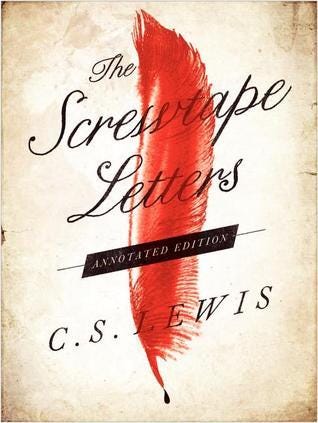Why You Should Read 'The Screwtape Letters'
A modern classic with a culturally-rich perspective on the history of temptation and the folly of man through the ages.
The Screwtape Letters is an epistolary novel written as a fictional approach to Christian apologetics. Set to the backdrop of the second World War, a senior demonic figure named Screwtape pens a series of letters addressed to a junior tempter, his nephew Wormwood. Through this hellish collection, Screwtape mentors Wormwood in securing the damnation of a British man known only as “the Patient.” Employing thick satire, Lewis addresses Christian theological issues, with a primarily focus on temptation and its resistance.
In a letter to his brother, C.S. Lewis described his inception of The Screwtape Letters, as being a portrayal of “all the psychology of temptation from the other point of view.”
But in a 1963 Interview, Lewis revealed that of all his books, The Screwtape Letters was the only one which he did not take pleasure in writing. “Dry and gritty going,” was how he described the experience. “At the time,” he said “I was thinking of objections to the Christian life and decided to put them in the form ‘That’s what the devil would say.’ But making goods ‘bad’ and bads ‘good’ gets to be fatiguing.”
And it seems that his disdain for the work resonated with his peers. ‘J.R.R. Tolkien's Sanctifying Myth: Understanding Middle-earth’ is a 2002 study of Tolkien’s lore. In it, the author Bradley J. Birzer writes that: “In thanks for their then thirteen-year-old friendship, Lewis dedicated The Screwtape Letters to Tolkien and inscribed in the copy he gave his friend, "In token payment of a great debt." Lewis's dedication angered Tolkien, for the book had deeply disturbed him. How could Lewis have delved so deeply into the arts of the Enemy, Tolkien must have wondered? In no uncertain terms, Tolkien disapproved of such ventures—even when undertaken by good Christians like Lewis.”
So, if C.S. Lewis didn’t enjoy writing it, and J.R.R. Tolkien disapproved of it, why should you read The Screwtape Letters?
Through satire, Lewis offers a culturally-rich perspective to the under-explored history of temptation, and the folly of man through the ages. In this modern classic, the attentive reader should recognize their own thought patterns at some point or another, and may hope to gain a fresh outlook on themselves.
And to the embattled Christian, it can be helpful to recognize where one has repeatedly struggled through the many wiles of the enemy, and see the fiery darts of Satan for what they are — for the war on sin and temptation is so rarely fought on the battlefield of reason, but on fuddled feelings, pride, and failure to recognize who you are in Christ. And though Satan is the great deceiver, he and his minions are ultimately the ones who are so thoroughly deceived.
Finally, it should go without saying that hell isn’t some dry bureaucracy, as it is allegorically portrayed in The Screwtape Letters — though some might consider their government job to be a form of hell. But if the Most High God is one who brings order out of nothingness, than it does stand to reason that his absence would create a significant vacuum of order, which is chaos. And so, while the allegory cannot be perfect, it is quite comical. What is a bureaucracy if not an overly-bloated and unhealthy abuse of order?
In short, The Screwtape Letters lends an uncanny perspective on sin, and its place within the cosmic rebellion against our creator.





C.S. Lewis offers very informative insights in “The Screwtape Letters” and successfully portrays to readers the many vices that Satan uses to ensnare Christians. It is a very underrated book. Great summary, Blake!
Interesting history I never heard before! I enjoyed reading The Screwtape Letters. I can see why it was so challenging to write. In a culture that calls good bad and bad good, it’s an appropriate take!